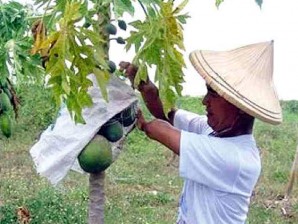ROSALES, Pangasinan—Every day, 34-year-old Donald Carpo rises very early to work on a 1.5-hectare vegetable farm near SM City Rosales here.
He joins three others to water the plants, pull out the weeds, apply fertilizer and manually remove pests from fruit crops.
The land, which used to be idle, was transformed in 2010 into a farm through the committee on disability affairs of SM Cares program, said Jersey Mendoza, an engineer and SM City Rosales manager.
Before the mall opens at 10 a.m., Carpo slips into his work clothes as maintenance employee and goes about his work in the mall for the rest of the day.
For a person with clubfoot, a congenital deformity where a foot appears to have been rotated internally at the ankle, just walking to and around the farm and the spacious mall is a daily struggle.
But his disability did not deter him from doing his work well, and from being a good team player to his similarly physically challenged farm workers and colleagues.
Early this year, the success of the farm project was recognized by the Asia-Pacific Development Center on Disability (APDCD).
Upon the invitation of the center, Carpo and Mendoza attended the United Nations-sponsored Regional Workshop on Disability-Inclusive Agribusiness Development in Bangkok last month.
“I did not expect that my disability, which I considered as a burden years ago, will be my passport to see another country,” said Carpo.
The two-day workshop, which was a joint project of APDCD, UN Food and Agriculture Organization and Nippon Foundation, was aimed at building and enabling environment for disability-inclusive agribusiness.
Over 120 delegates from different countries with disabled people engaged in agribusiness attended the workshop.
Carpo said the workshop helped him see through his disability and realize that he is part of the community who can contribute to his country.
He said he once tried to commit suicide because he was being bullied for his disability. “But I’m glad I am still alive to perform my role as a productive member of society,” he said.
He thanked SM City Rosales for the opportunity to find his self worth as part of the maintenance workforce at the mall and as a farm hand.
“I am thankful that when SM City Rosales hired me, they didn’t look at my physical disability. Instead, they believed that I have skills and talent that I can share and use productively,” said Carpo, who had worked as vendor, gasoline boy, car wash boy and vehicle dispatcher before SM hired him in 2010. Gabriel Cardinoza, Inquirer Northern Luzon
